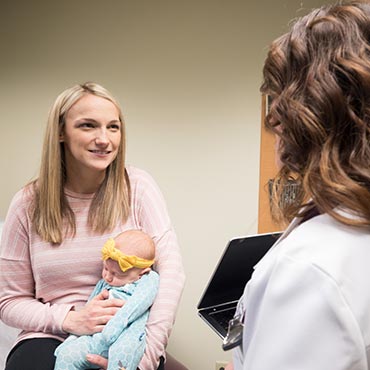After childbirth, it’s normal to feel postpartum effects. Taking care of your baby is important but so is taking care of yourself; your baby needs you to be healthy in order to take care of them.
Postpartum Effects on a Woman’s Body
If you ignore your postpartum symptoms, your health could be at great risk which could lead to your baby’s health declining. When a mother endures the miraculous journey of childbirth, a woman’s body can react in different ways; some are normal but some effects can be harmful if not treated.
Postpartum Examples a Mother May Endure:
- Postpartum Depression – Feeling the “baby blues” after childbirth is normal but knowing the different symptoms between “baby blues” and postpartum depression is important for your health. In the first 2-3 days after delivery, a mother can feel the “baby blues” which could last up to four weeks. Postpartum depression and anxiety can develop during the pregnancy, the first weeks after delivery, or at a later date up to one year after the birth. Postpartum depression symptoms are more intense and last longer than baby blues. If your symptoms are worsening or have not disappeared after two weeks, contact your OB/GYN immediately. There are safe antidepressants that can be used even while breastfeeding.
- Body Size – As the baby grows inside you, your belly and the rest of your body grow with it to provide the nutrients you and your baby need. After childbirth, your body may look the same as if you were still pregnant. Your body needs time to heal and return to its original condition. In fact, it takes about 6-8 weeks for your uterus to return to its original size.In addition to our tips below about improving your health after childbirth, also contact your OB/GYN at your women’s clinic to receive a postpartum check-up by six weeks post-birth. Your OB/GYN can check your body to ensure you’re healing correctly and can also provide you with professional advice on returning to the weight you prefer.
- Hair Loss – When you are pregnant, your estrogen levels are higher which is why you don’t shed as much hair. Post childbirth, your estrogen levels will decrease back to normal and result in your hair falling out which is normal. You can expect your hair shedding to return to normal typically within 6-12 months after delivery. Continue taking your prenatal vitamin postpartum and you may consider supplementing with Biotin if you are concerned with your hair loss.
- A Decrease in Sex Drive – Similar to how your hair loss differentiates post-childbirth due to estrogen levels, so does your sex drive. Since your estrogen level decreases after delivery, your sex drive will be low, but it is normal.It is also normal to experience some vaginal dryness, especially with breastfeeding. As your body heals your drive will return.If you are concerned about your sex drive or pain with intercourse, check-in with your OB/GYN during your postpartum exam. You and your OB/GYN know what is normal for your body; don’t be shy when asking questions about your health.
- Breast Changes – Typically breast milk begins to come in between days 3-4 after birth. Prior to this, you will produce colostrum. If you intend to breastfeed it is useful to take advantage of the lactation specialists while in the hospital. Mercy also provides outpatient lactation consultation postpartum if you run into any difficulties or need extra guidance. If you don’t intend to breastfeed then a tight-fitting bra is recommended in the immediate postpartum period to reduce your discomfort and inhibit milk production. If you have concerns about low production, breast lumps, or signs of mastitis you should contact your OB/GYN.
- Red Flags – If you are experiencing chest pain, shortness of breath, thoughts about hurting yourself or others or are passing large blood clots, contact your OB/GYN immediately and go to the emergency room.

How to Improve Your Health
No matter how you’re feeling after giving birth, be sure to schedule a postpartum appointment with your OB/GYN by six weeks post-delivery. Your doctor can inspect your health to ensure you are not experiencing severe health complications. During this appointment, it’s important, to be honest with your OB/GYN about how you’re feeling. Based on your symptoms, your OB/GYN can advise you on what is normal and what steps to take to help improve your symptoms.
Exercising does not affect your breast milk production, but if you are breastfeeding, make sure to feed your baby prior to exercising so you don’t experience discomfort.
How West Des Moines OB/GYN Can Help You
As your comprehensive women’s health center, our OB/GYNs are there for you through prenatal care, delivery, and postpartum check-ups.
We will let you know when and how often to schedule your postpartum visits but typically we see cesarean sections at 2 and 6 weeks postpartum and vaginal deliveries at 4-6 weeks postpartum. If you had any complications with your delivery or health we may ask to see you more frequently.
During your postpartum appointments, we will assess and discuss your:
- Mood and emotional well-being
- Baby’s health and nutrition as well as any concerns with breastfeeding.
- Contraception options
- Sleeping habits/fatigue
- Recovery from giving birth
- Chronic disease management
- Health plan/Annual visit
Having a child is a blessing, but to take care of your child, you have to take care of yourself too. Schedule your initial postpartum appointment and from there, we can create your healthcare plan. As your women’s health clinic, West Des Moines OB/GYN specializes in caring for you. Contact us to schedule an appointment with one of our OB/GYNs.


